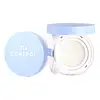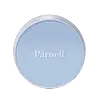What's inside
What's inside
 Key Ingredients
Key Ingredients

 Benefits
Benefits

 Concerns
Concerns

 Ingredients Side-by-side
Ingredients Side-by-side

Water
Skin ConditioningDimethicone/Vinyl Dimethicone Crosspolymer
Skin ConditioningSilica
AbrasiveGlycerin
HumectantGlyceryl Glucoside
HumectantButylene Glycol
Humectant1,2-Hexanediol
Skin ConditioningC12-14 Pareth-12
EmulsifyingPhenoxyethanol
PreservativeXanthan Gum
EmulsifyingBenzoic Acid
MaskingMethylparaben
PreservativeChlorphenesin
AntimicrobialDisodium EDTA
Sodium Hyaluronate
HumectantGlucose
HumectantPolyglyceryl-3 Methylglucose Distearate
EmulsifyingCetearyl Alcohol
EmollientPropanediol
SolventHamamelis Virginiana Extract
AntiseborrhoeicAcmella Oleracea Extract
Skin ProtectingWater, Dimethicone/Vinyl Dimethicone Crosspolymer, Silica, Glycerin, Glyceryl Glucoside, Butylene Glycol, 1,2-Hexanediol, C12-14 Pareth-12, Phenoxyethanol, Xanthan Gum, Benzoic Acid, Methylparaben, Chlorphenesin, Disodium EDTA, Sodium Hyaluronate, Glucose, Polyglyceryl-3 Methylglucose Distearate, Cetearyl Alcohol, Propanediol, Hamamelis Virginiana Extract, Acmella Oleracea Extract
Water
Skin Conditioning1,2-Hexanediol
Skin ConditioningButylene Glycol
HumectantXanthan Gum
EmulsifyingDisodium EDTA
Silica
AbrasiveAluminum Starch Octenylsuccinate
AbsorbentDimethicone
EmollientBentonite
AbsorbentEthylhexylglycerin
Skin ConditioningHydrolyzed Collagen
EmollientBifida Ferment Lysate
Skin ConditioningLactobacillus Ferment
Skin ConditioningPseudoalteromonas Ferment Extract
HumectantSodium Hyaluronate
HumectantTocopherol
AntioxidantHydrolyzed Elastin
EmollientWater, 1,2-Hexanediol, Butylene Glycol, Xanthan Gum, Disodium EDTA, Silica, Aluminum Starch Octenylsuccinate, Dimethicone, Bentonite, Ethylhexylglycerin, Hydrolyzed Collagen, Bifida Ferment Lysate, Lactobacillus Ferment, Pseudoalteromonas Ferment Extract, Sodium Hyaluronate, Tocopherol, Hydrolyzed Elastin
Ingredients Explained
These ingredients are found in both products.
Ingredients higher up in an ingredient list are typically present in a larger amount.
1,2-Hexanediol is a synthetic liquid and another multi-functional powerhouse.
It is a:
- Humectant, drawing moisture into the skin
- Emollient, helping to soften skin
- Solvent, dispersing and stabilizing formulas
- Preservative booster, enhancing the antimicrobial activity of other preservatives
Butylene Glycol (or BG) is used within cosmetic products for a few different reasons:
Overall, Butylene Glycol is a safe and well-rounded ingredient that works well with other ingredients.
Though this ingredient works well with most skin types, some people with sensitive skin may experience a reaction such as allergic rashes, closed comedones, or itchiness.
Learn more about Butylene GlycolDisodium EDTA plays a role in making products more stable by aiding other preservatives.
It is a chelating agent, meaning it neutralizes metal ions that may be found in a product.
Disodium EDTA is a salt of edetic acid and is found to be safe in cosmetic ingredients.
Learn more about Disodium EDTASilica, also known as silicon dioxide, is a naturally occurring mineral. It is used as a fine, spherical, and porous powder in cosmetics.
Though it has exfoliant properties, the function of silica varies depending on the product.
The unique structure of silica enhances the spreadability and adds smoothness, making it a great texture enhancer.
It is also used as an active carrier, emulsifier, and mattifier due to its ability to absorb excess oil.
In some products, tiny microneedles called spicules are made from silica or hydrolyzed sponge. When you rub them in, they lightly polish away dead skin layers and enhance the penetration of active ingredients.
Learn more about SilicaSodium Hyaluronate is hyaluronic acid's salt form. It is commonly derived from the sodium salt of hyaluronic acid.
Like hyaluronic acid, it is great at holding water and acts as a humectant. This makes it a great skin hydrating ingredient.
Sodium Hyaluronate is naturally occurring in our bodies and is mostly found in eye fluid and joints.
These are some other common types of Hyaluronic Acid:
Learn more about Sodium HyaluronateWater. It's the most common cosmetic ingredient of all. You'll usually see it at the top of ingredient lists, meaning that it makes up the largest part of the product.
So why is it so popular? Water most often acts as a solvent - this means that it helps dissolve other ingredients into the formulation.
You'll also recognize water as that liquid we all need to stay alive. If you see this, drink a glass of water. Stay hydrated!
Learn more about WaterXanthan gum is used as a stabilizer and thickener within cosmetic products. It helps give products a sticky, thick feeling - preventing them from being too runny.
On the technical side of things, xanthan gum is a polysaccharide - a combination consisting of multiple sugar molecules bonded together.
Xanthan gum is a pretty common and great ingredient. It is a natural, non-toxic, non-irritating ingredient that is also commonly used in food products.
Learn more about Xanthan Gum